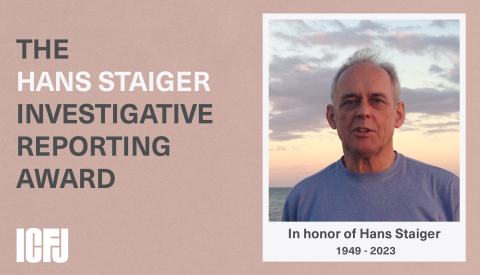
The International Center for Journalists (ICFJ) is launching an investigative reporting award in honor of Hans A. Staiger, a champion of journalism who devoted more than two decades of his life to helping fellow reporters across the world.
Staiger, who died Feb. 16, was a longtime consultant for ICFJ who oversaw many programs, from Azerbaijan to East Timor. Most prominently, he ran the Regional Investigative Journalism Network in Eastern Europe in conjunction with the Organized Crime and Corruption Reporting Project (OCCRP). He helped manage that initiative for 12 years. Before his work with ICFJ, Staiger spent 10 years in media development for the BBC, where he started and ran the BBC School of Journalism in war-torn Sarajevo, helping to create the first generation of journalists after the war.
“Hans deeply believed in the power of investigative journalism to expose corruption and hold leaders accountable,” said ICFJ President Sharon Moshavi. “We are pleased to honor his legacy through the Hans Staiger Investigative Journalism Award.”
The award will support top reporters anywhere in the world who propose an investigative project that requires additional funding. Friends and admirers of Staiger can donate to the award in his honor. For those journalists interested in applying for the award, ICFJ will provide a link for applications shortly. Follow @ICFJ on Twitter to receive a notification.
Staiger began his career as a journalist for the BBC German Language Service, and went on to spend more than 20 years as a journalist for the BBC, managing coverage of the aftermath of the Vietnam War, the fall of the Berlin Wall and the rise of democracies in Eastern Europe.
“It’s comforting to know that Hans’ legacy will live on through the journalists supported by this award,” said Staiger’s wife, ICFJ Senior Vice President for Development Vjollca Shtylla. “He would have been proud.”